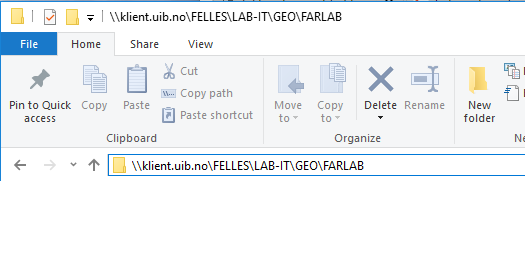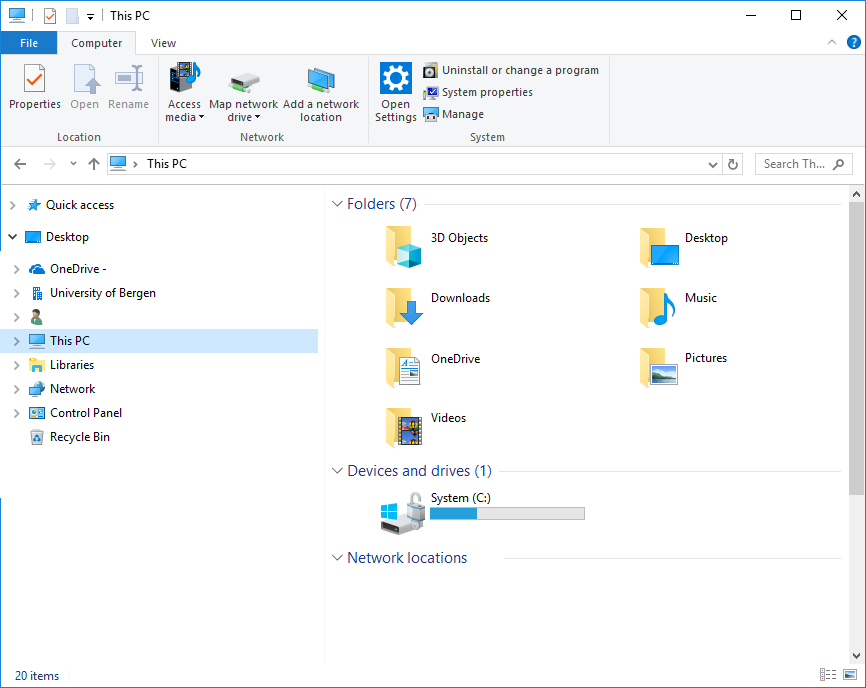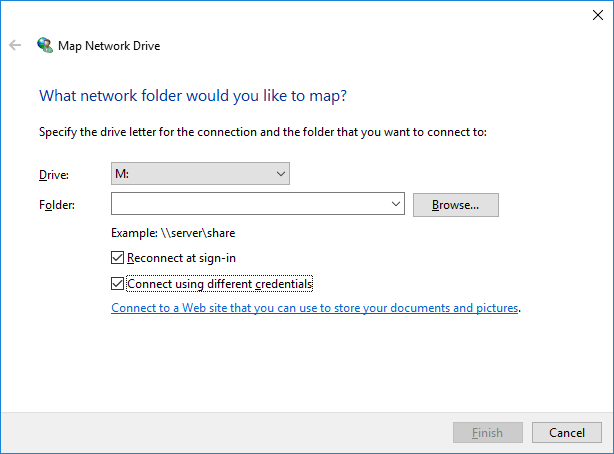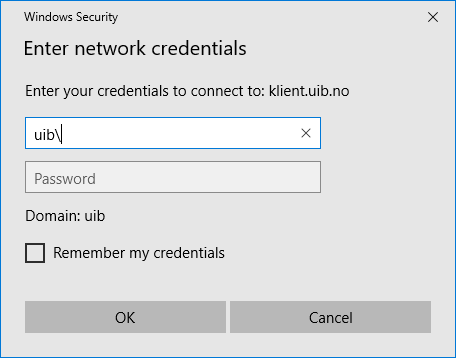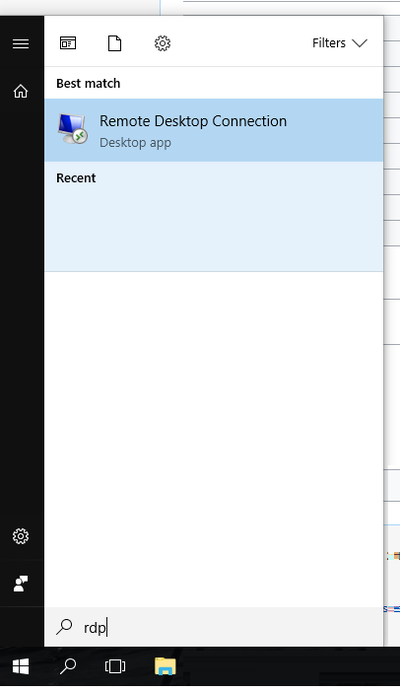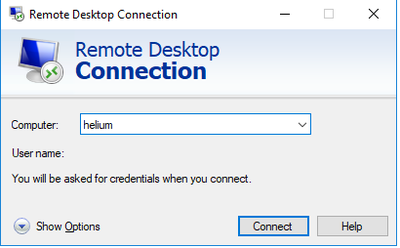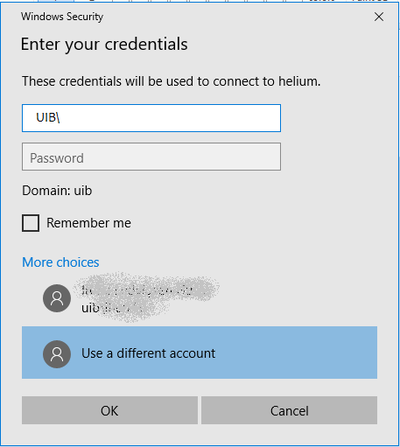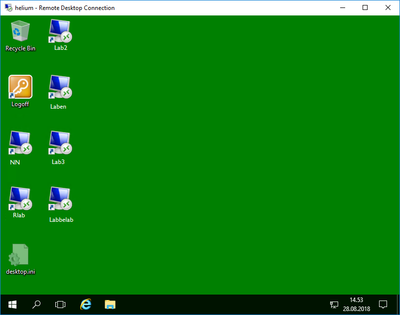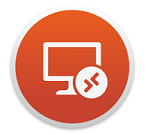Lab-IT: Difference between revisions
No edit summary |
No edit summary |
||
| Line 162: | Line 162: | ||
|- | |- | ||
|[[https://www.uib.no/en/kj/research-groups KJ]] | |[[https://www.uib.no/en/kj/research-groups KJ]] | ||
| | |GSC | ||
| | | | ||
|[[https://www.uib.no/personer/Bjarte.Holmelid Bjarte Holmelid]] | |[[https://www.uib.no/personer/Bjarte.Holmelid Bjarte Holmelid]] | ||
| Line 170: | Line 170: | ||
|- | |- | ||
|[[https://www.uib.no/en/kj/research-groups KJ]] | |[[https://www.uib.no/en/kj/research-groups KJ]] | ||
| | |HPLC | ||
| | | | ||
|[[https://www.uib.no/personer/Bjarte.Holmelid Bjarte Holmelid]] | |[[https://www.uib.no/personer/Bjarte.Holmelid Bjarte Holmelid]] | ||
Revision as of 06:16, 26 June 2019
This web page is under construction
Lab-IT is a new service provided by the IT department and developed in close collaboration with the laboratory environments. Lab-IT will ensure that insecure and vulnerable instruments can be connected to the UiB network.
Connect a Lab-PC to Lab-IT
Lab-Administrator(s) can create an issue at https://bs.uib.no and provide relevant information like building, department, research group etc.
Functionality
Access
The Lab-Administrator(s) manage access via https://portal.uib.no If you want access, contact your Lab-Administrator.
Copy raw data from Lab-PC
Lab-PC's connected to Lab-IT will have raw data automatically copied from the Lab-PC to a temporary common area (Lab-IT storage). The copy frequency are usually once per hour, but there may be local adaptations.
Each researchgroup have a different storage area; see the table below for more information.
In the Lab-IT storage, regular lab users should have read-only access. Only and Lab-Administrator(s) should have write-access. Data should be copied to the desired permanent area for further processing. Write-access is not necessary in order to copy data from Lab-IT storage.
The common area (Lab-IT storage) are available from your office computer, self managed and private computers, see this guide for more information https://it.uib.no/en/Lab-IT#Access_raw_data
Monitoring and remote access
Monitoring and remote access to Lab-PC’s are possible from terminal servers. You must use RDP to connect to the terminal server, see the RDP guide below https://it.uib.no/en/Lab-IT#RDP
Each researchgroup have their own terminal server(s); see the table below for more information.
Image/backup of Lab-PC installasion and setup
Some Lab-PC's have a complicated installation or setup, and it can be difficult to recreate if anything bad should happen. IT-department can make an image of the hard drive that can be restored. It is possible to extract files form the image as well. Be aware of:
- It is not possible to make image of all Lab-PC's
- Sometimes, it is not possible to restore the image to another hard drive.
Would you like an image of a Lab-PC then you make an issue at http://bs.uib.no
Managed Lab-PC
Lab-IT have a pilot-solution for windows 10 UiB-managed computers, where the goal is to offer self-service access-management, remote access to the lab-pc and centralized storage (if needed). Contact http://bs.uib.no for details.
Stand-alone/unmanaged Lab-PC
Unmanaged Lab-PC (not manged by IT-department) can have raw data automatically copied to the Lab-IT storage and be monitored via a terminal server.
Long-term archiving (BILLY)
The storage for long-term archiving of large amounts of "cold data" is called BILLY. If you would like more information about BILLY, please make an issue at[BRITA/brukerstøtte]
General information about BILLY:
Billy is the name of a service meant for low-cost, long-term storage of data. It is meant as a location for “cold” data that one wants to keep without accessing it. The data stored in Billy will have a long access time (several minutes), and the data stored here is not meant to be accessed very often. The type of data should be for example raw data from research projects, video files and other data that is finished and processed. If the data consists of many small files, LAB-IT will help you archiving it with tar/zip/rar or similar before it is copied into Billy.
The service functions as a regular file-share like any other storage area, that can be accessed via SMB (Windows/Mac) or NFS (Linux). In the background, the files are moved to low-cost tape storage, invisible for the user. When the files are to be accessed after some time, the service then needs to retrieve it from tape. This means that it will take some time from you open/copy the file until it is available. If you know that you need to retrieve many files/folders from tape at once, you can create an issue at https://bs.uib.no/. This way we can retrieve it from tape beforehand, so that the files are available to you when you need it.
The cost of the service is 250 Kr per terabyte, per year. The service is sold in chunks of 50 terabyte. The unit you belong to will be invoiced biannually based on the volume you have ordered. If you need more storage space you can create an issue at https://bs.uib.no/, and we will allocate more space for you.
Errors
Please report errors at http://bs.uib.no
Questions
Questions can be asked at http://bs.uib.no
Changes
Would you like to suggest any changes in the setup at a specific laboratory, please contact the Lab-Administrator(s). If you would like to suggest any generally changes to the Lab-IT setup please make an issue at http://bs.uib.no
Purchasing instruments
The IT-department would like to give advice regarding procurement of new instruments and software. Suppliers rarely consider IT-security or IT-management when they develop laboratory instruments and software. As a result, Lab-PC's are often vulnerable even when they are new. Therefore, there should be made some demands in the requirement specification. If you like support from IT-department in this matter please make an issue at http://bs.uib.no
Overview LAB-IT
| Institute | Researchgroup | Lab-PC name code | Lab-Administrator(s) | Terminalserver | Path (50GB standard storage) | BILLY (Long time Archive) | |
| [GEO] | CORESCANNER | COR | [Eivind Wilhelm Nagel Støren] | iron.uib.no | \\Klient.uib.no\FELLES\LAB-IT\GEO\CORESCANNER\ | ||
| [GEO] | CT | ECT | [Eivind Wilhelm Nagel Støren] | neon.uib.no | \\Klient.uib.no\FELLES\LAB-IT\GEO\CT | \\klient.uib.no\FELLES\BILLY\Prosjekt\EARTHLAB\ | |
| [GEO] | EARTHLAB | ERT | [Eivind Wilhelm Nagel Støren] | xenon.uib.no | \\Klient.uib.no\FELLES\LAB-IT\GEO\EARTHLAB\ | ||
| [GEO] | ELMI | ELM | [Olav-Audun Bjørkelund] | \\klient.uib.no\FELLES\LAB-IT\GEO\ELMI | NA | ||
| [GEO] | FARLAB | FAR | [Pål Tore Mørkved] | helium.uib.no | \\klient.uib.no\FELLES\LAB-IT\GEO\FARLAB\ | NA | |
| [GEO] | GC-MS | GCM | [Eoghan P. Reeves] | \\klient.uib.no\FELLES\LAB-IT\GEO\GC-MS | NA | ||
| [GEO] | ICP | ICP | [Siv Hjort Dundas] | barium.uib.no | \\klient.uib.no\FELLES\LAB-IT\GEO\ICP | NA | |
| [GEO] | RAMAN | RAM | [Olav-Audun Bjørkelund] | calcium.uib.no | \\klient.uib.no\FELLES\LAB-IT\GEO\RAMAN | NA | |
| [KJ] | IR | INF | [Egil Nodland] | copper.uib.no | \\klient.uib.no\FELLES\LAB-IT\KJ\IR | NA | |
| [KJ] | NMR | [John Georg Seland] | NA | ||||
| [KJ] | MS | MAS | [Bjarte Holmelid] | \\klient.uib.no\FELLES\LAB-IT\KJ\MS | NA | ||
| [KJ] | GSC | [Bjarte Holmelid] | NA | ||||
| [KJ] | HPLC | [Bjarte Holmelid] | NA |
User guide
Access raw data
Off campus you can connect to UiB network using VPN See this guide for more information https://it.uib.no/en/VPN,_Virtual_private_network
Windows
On a UiB managed computer, just type the path in Explorer
You find the path for your lab here: https://it.uib.no/en/Lab-IT#Overview_LAB-IT
On a self managed or a private computer:
- Open Explorer
- Click on This computer in the left menu
- Then click on Map network drive button in the top menu
- Type the path in the folder field
- Check Connect using different credentials
Type your uib username and password
- Type uib\ before your username
Mac
https://it.uib.no/en/Mac_OS_X:_Connecting_to_your_network_share
Linux
https://it.uib.no/Oppkobling_mot_Unix_hjemmeomr%C3%A5de
RDP
Windows
RDP (Remote Desktop Connection) are default installed on all Windows computers. 1. Just click on the start button and type rdp. 2. Then, Click on the Remote Desktop Connection app.
In Computer field, type the name of the terminalserver. Have you forgotten the name, see this list https://it.uib.no/en/Lab-IT#Overview_LAB-IT
- In this example, we are connecting to helium.
Type your UiB username and password
Be aware of:
- The domain should be set to uib, if not then type uib\ before your username
- If you can’t change the username, choose More choices and choose “Use a different account”
Connect to the lab-PC by clicking on the icon for the lab-PC
Mac
Install Microsoft Remote desktop from Managed Software Update or from Mac App Store.
1: Choose "new" to create a profile: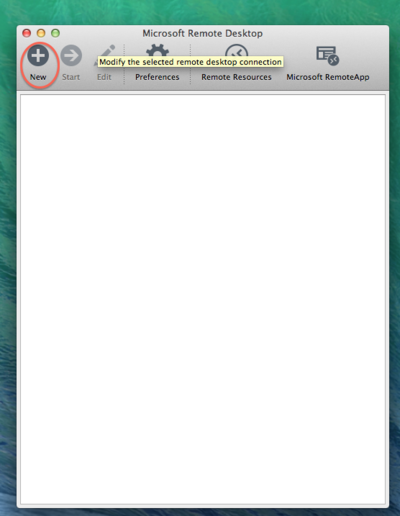
2:Write in your username with uib\ in front as shown.
In the PC name field, type the name of the terminalserver. Have you forgotten the name, see this list https://it.uib.no/en/Lab-IT#Overview_LAB-IT In this example, we are connecting to helium.
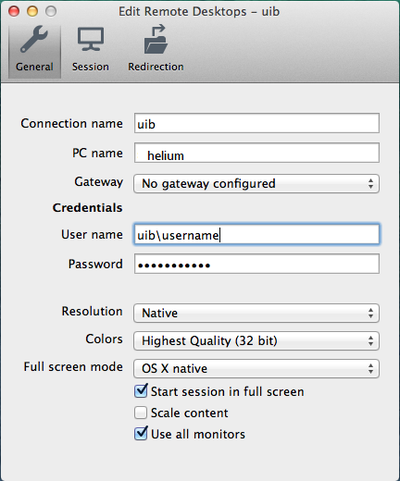
3: Close the window, mark the profile you just created and press start: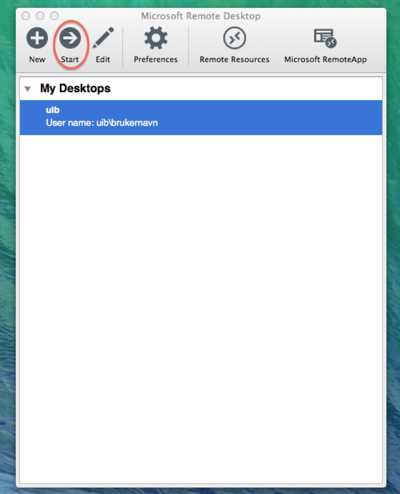
4: You will now see å page where you need to verify the certificate. Press continue. 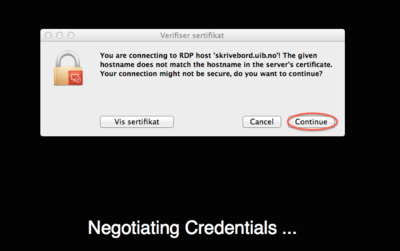
Linux
In this guide we are using rdesktop In Ubuntu the software can be downloaded from Ubuntu_softwarecenter, search for "rdesktop". You can also install the software from terminal using the following command: sudo apt-get install rdesktop
Start rdesktop by opening Terminal and run:
rdesktop -d uib -k no skrivebord.uib.no
Arguments
Rdesktop works with several arguments. The most important are described below. See rdesktop(1) for full description. In terminal, run:
man rdesktop
- Username and domain
rdesktop -d uib helium Rdesktop assumes you are using the same username on you machine as on the terminal. If this is not the case, you can set the username in the commandline with the argument "-u yourusername", like this: rdesktop -d uib -u abc123 skrivebord.uib.no Remember to switch abc123 with your username.
- Keyboard
Standard keyboard in rdesktop is American. If you have a Norwegian keyboard you can set the change in rdesktop using the argument "-k no", like this: rdesktop -k no skrivebord.uib.no
- rdesktop-window size
To set a specific size for the rdesktop-window use argument "-g <size of the window, length x height>", like this: rdesktop -g 1024x768 skrivebord.uib.no You can also use % rdesktop -g 90% skrivebord.uib.no Setting the size in percentage works best if you only have one screen. If you use two screens, rdesktop will treat it as one extra large screen instead. Rdesktop full screen: -f rdesktop -f skrivebord.uib.no Using this command, rdesktop will cover both screens if using two. Use the key combination Ctrl+Alt+Enter to switch between Linux- and Windows environment.
Lab Administrator
User guide https://it.uib.no/ithelp/images/8/80/LAB-IT_Manager_-_Users%27s_guide.pdf
